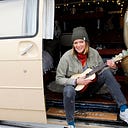How I’m able to spend the night (and actually sleep) in Skid Row
My work leads me to stay in this complicated unhoused community quite often; that would be impossible without the alliances that keep me safe.
RePete looked at me.
It was late, rounding past midnight, and I’d stepped away from our Skid Row grill operation to talk to him.
Knowing that I would later retreat into my cargo van parked just across the street, he gestured to the giant sledgehammer affixed to the top of his backpack.
“You don’t even know,” he said, “how many people are watching out for you while you sleep.”
This conversation, about six months ago, was not a casual one. Pete was voicing his support. And that fact was everything. But of course, spoken or unspoken, I already knew.
“I do know,” I told him. “It is how I am able to sleep at night.”
That I do, in Skid Row, quite often now — a result of my intimate work reporting and organizing mutual aid in the area. I spent a lot of time socializing and cooking meals, as well as researching and funding solutions to basic day-by-day needs. And then I’ll just crash there, in my van, amidst the tents.
But without people like Pete, I certainly could not.
Skid Row, as I have learned after thousands of hours reporting and spending time there, is many things.
It is a neighborhood characterized by earnest survival and resilience. It is a community filled, often, with moments of joy. It is a clinic in the capacity for ingenuity, creativity and shared responsibility.
It is also a place of chaos, of deep-seeded need and acute danger.
Because of that inherent chaos, loyalty and community in Skid Row is essential. I wouldn’t stay there without it — nor did I even attempt to until after months of consistent visits and spending time sans notebook or camera.
Pete — the de facto “fixer” on Crocker Street — has self assigned his role as my protector, a fact that gives me both comfort and occasional anxiety. (One late night after cooking, Pete proclaimed the safe signal was “my uncle’s name is Bob” and if he knocked on my van door in the night and heard anything but, he was breaking in. I immediately repeated it seven times and wrote it in my phone.)
He tells me often that when he wakes up in the middle of the night, he walks over to Bertie and makes sure everything looks in order. I believe him.
So incredibly, while other things in Skid Row keep me up at night (noise, conflict, worry of being towed) my safety is not one of them.
I met RePete about 15 months ago, on my first visit to Skid Row. That day, I first encountered Pastor Blue, whose “territory” I now park and sleep in when I stay overnight — impossible without the friendship and alliance of this man and community leader, who lives out of his van and operates a multiple-tent community center on the sidewalk nearby.
Maybe a half hour into my chat with Blue, Pete showed up. Hollywood — Blue’s neighbor and the other half of the “Blue Hollywood” moniker they gave this portion of Crocker Street — introduced him as “the mechanic,” with pertinent context: it wasn’t cars that he fixed.
“You’ve always got to have someone like this around,” Hollywood said. “At times, you don’t fight fire with water; you fight it with fire. This is the one that does that.”
I don’t remember Pete saying a word that day — just that he leaned against a tent structure with his arms crossed, looking every bit as imposing as the words spoken about him.
But later, after getting close with Blue, Pete and I became friends. I discovered that the he was a history buff, like me, and a veteran with gripping tales of the US’ intervention in Grenada. I found that he loves to read — no really; he was reading 170 books a year at one point — and he could recite the gist of every one as thoroughly as though I was studying it myself. I imagine that Pete — who seems to retain most of what he absorbs — would probably test as a genius. He also gives the best car washes on the block, and this time, I waited weeks so that he could be the one to give Bertie a bath.
Pete, like me, is an introvert, which means we have many conversations in the middle of the street, away from the crowd that often gathers at Blue’s “community center.”
He tells me jokes. We talk about our books. He tries to teach me about quantum physics. And he tells me if anyone ever fucks with me — in Skid Row or out — I need only to give him a name.
Recently, Pete got a kitten — he named her Cat, as he would — and I told him I was worried what it would do for his rugged reputation if he started walking around with a kitten on his shoulder.
The truth is, I have learned, people can be many things. Pete’s force is necessary in a community that had traditionally self-policed thanks to the city’s official systems often ignoring or even inciting violence here. And that safeguard — rather than any formal means — is what allows me to do what I do.
But those of us lucky to have gotten close enough know there’s also been a big softie underneath all along.
